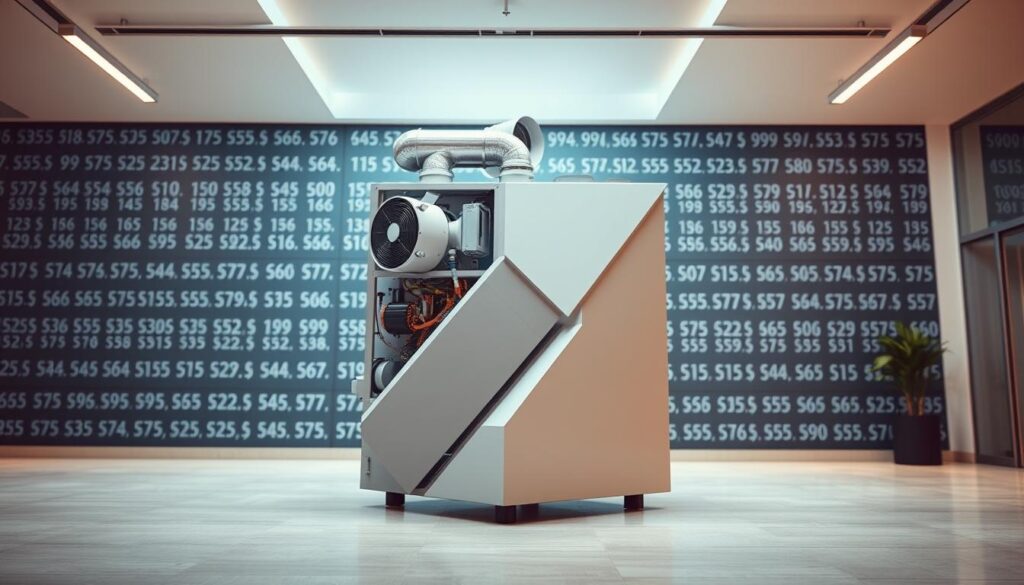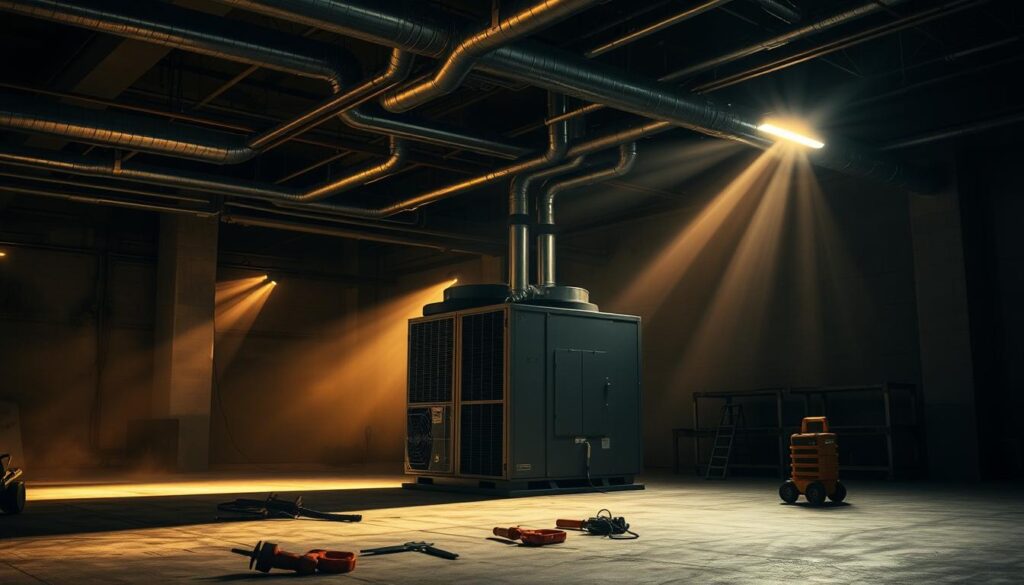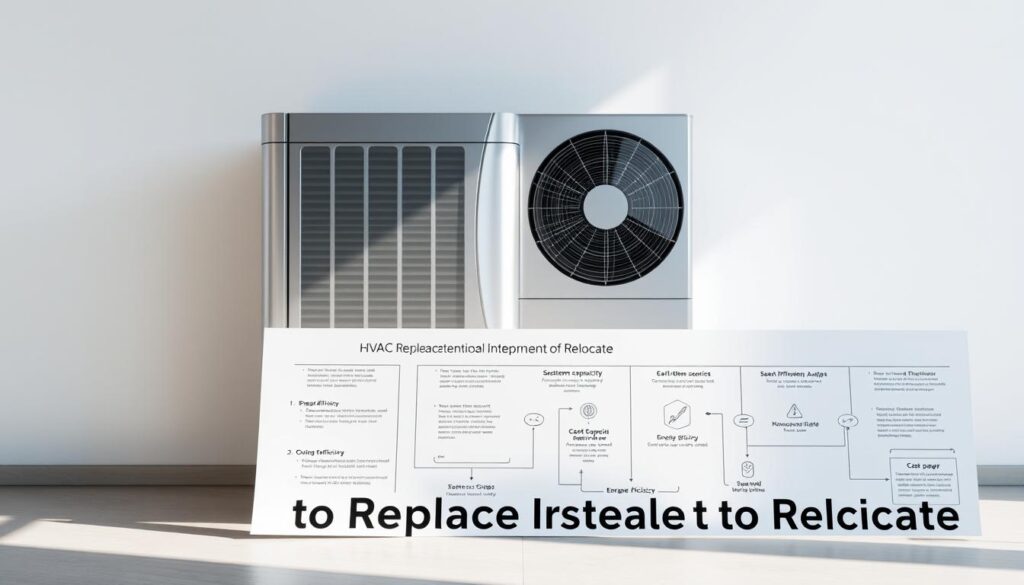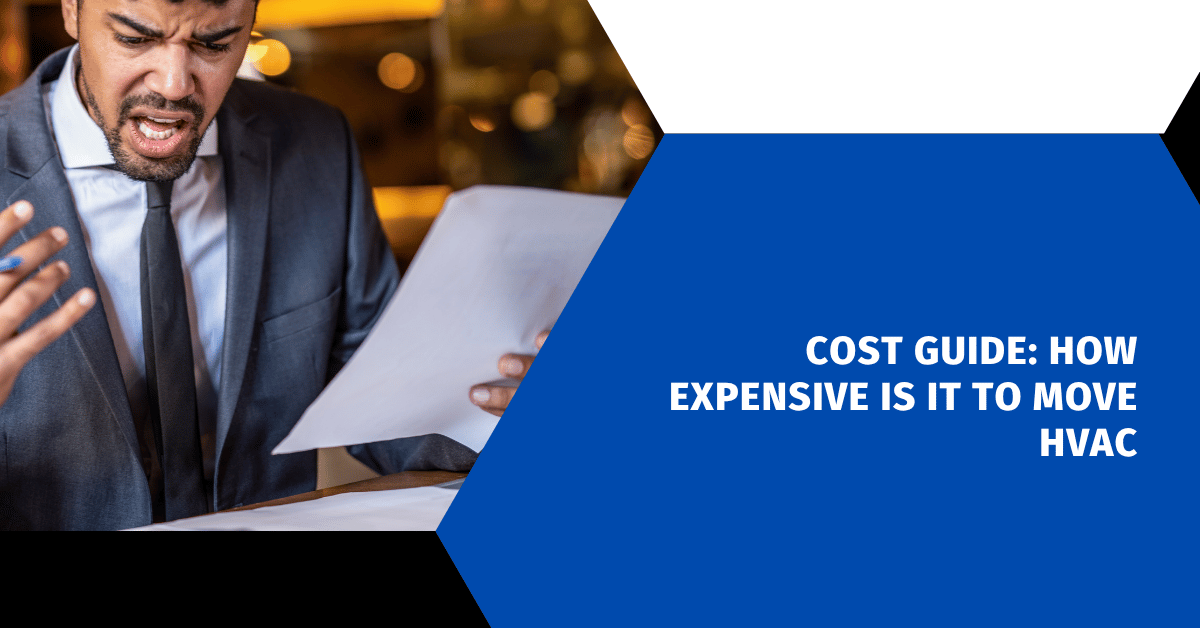Affiliate Disclosure
HVAC Guide Guys is a participant in the Amazon Services LLC Associates Program, an affiliate advertising program designed to provide a means for sites to earn advertising fees by advertising and linking to Amazon.
How Expensive Is It To Move HVAC? Ever wondered what financial surprises await when relocating your home’s heating and cooling systems? Understanding the true cost of HVAC relocation can be a game-changer for homeowners planning renovation or construction projects.

The cost of moving HVAC systems can vary a lot. Moving an AC unit can cost between $1,500 to $2,500. Moving a furnace can be even more complex, costing up to $10,000 for detailed jobs. These costs might seem high, but they show the detailed technical skill needed to safely move your home’s climate control systems.
When looking into the cost of moving HVAC, homeowners need to think about more than just moving it. They must also consider electrical changes, ductwork adjustments, and specialized labor. All these factors add to the total cost.
Key Takeaways
- HVAC relocation costs vary widely based on system complexity
- AC unit moves typically range from $1,500 to $2,500
- Furnace relocations can cost between $3,000 and $10,000
- Professional expertise is key for safe and efficient HVAC moving
- Factors like distance, accessibility, and system age impact total expenses
Table of Contents
Understanding HVAC Relocation Basics
Moving an HVAC system needs careful planning. You must know about different parts and things to consider. The cost of moving your HVAC can change based on how complex it is. Homeowners look at different prices for HVAC units to keep their homes comfortable and efficient.
Types of HVAC Units That Can Be Relocated
Not every HVAC system can be moved easily. Each type has its own special features that affect how it can be moved:
- Split systems (most common residential type)
- Central air conditioning units
- Heat pumps
- Geothermal systems
- Ductless mini-split systems
Key Components Involved in Moving HVAC Systems
To move an HVAC system right, you need to know about important parts:
| Component | Relocation Complexity |
|---|---|
| Refrigerant Lines | High precision required |
| Ductwork | Extensive modification possible |
| Electrical Connections | Needs professional reconfiguring |
| Condenser Unit | Must be handled with care |
Common Reasons for HVAC Relocation
People move their HVAC for many good reasons:
- Noise reduction in living areas
- Improving property layout
- Making the property look better
- Reducing debris
- Boosting system performance
“Knowing if your HVAC can be moved can save money and trouble.” – HVAC Professional Insight
Before starting an HVAC move, talk to certified experts. They can check if your system can be moved and what it might cost.
Average Costs to Move AC Units and Furnaces
Knowing the costs for moving HVAC equipment helps you plan your budget. The prices change based on the unit type and move complexity.
For air conditioning units, expect to pay $1,500 to $2,500 for short moves. Furnace moves are more complex and costly, with prices from $3,000 to $10,000 for detailed installations.
“The cost of moving HVAC equipment is not just about physical relocation, but ensuring optimal performance in the new space.”
- AC Unit Relocation Costs:
- Average move: $1,500 – $2,500
- Moving around a corner: 25% of new unit cost
- Estimated time: Half a day
- Furnace Relocation Costs:
- Average move: $3,000 – $10,000
- Reconfiguring ductwork: Additional $2,000+
- Estimated time: Full day to two days
The cost of hvac installation depends on several factors. These include the unit’s age, move complexity, and any extra work like ductwork changes. New, efficient units might cost more but save energy in the long run.
Professional HVAC technicians suggest thinking about the cost-effectiveness of moving an older unit. The move costs might be more than the unit’s remaining life.
Explore Our HVAC Shop
Looking for top-rated HVAC tools, parts, and accessories? Visit our shop and find the perfect solution for your needs.
Visit the ShopHow Expensive Is It To Move HVAC: Breaking Down the Expenses
Understanding the costs of moving an HVAC system is key to planning and budgeting. The expenses can change a lot based on several important factors.
Labor Costs and Time Requirements
Moving an HVAC system needs a lot of labor. The time and skill needed can affect your costs:
- Moving an air conditioner takes 4-8 hours
- Furnace relocation can take 1-2 days
- Labor costs are $50 to $100 per hour
Material and Equipment Expenses
The cost of materials is a big part of moving an HVAC system. You’ll need to set aside money for different parts:
| Component | Estimated Cost |
|---|---|
| Refrigerant Lines | $500 – $1,500 |
| Ductwork Modifications | $1,000 – $3,000 |
| Electrical Components | $300 – $800 |
Additional Service Fees
There are extra costs beyond just moving the system. These can add up to your total costs:
- Permit fees: $100 – $500
- Inspection costs: $200 – $400
- Potential structural modifications: $500 – $2,000
“The total cost of moving an HVAC system can range from $1,500 to $3,000, depending on complexity and distance.”
When figuring out the cost to move HVAC, think about all these points. This helps avoid unexpected costs. Talking to a professional can give you a better idea of what you’ll need to spend.
Factors Affecting HVAC Relocation Costs
Understanding what affects hvac migration costs is key to planning your HVAC shifting expenses. Several factors influence the total cost of moving your heating and cooling system.
- Distance of Relocation: The move’s length greatly affects costs
- Unit Size and Type: Bigger or more complex systems cost more to move
- Age of HVAC System: Older systems might need extra care during the move
- Accessibility: Hard-to-reach spots raise labor costs and time
“Every HVAC move is unique, with costs varying based on specific project requirements.”
Important technical aspects that impact hvac migration costs include:
- Refrigerant line limitations
- Electrical connections and power switches
- Potential system modifications
- Permit and code compliance
| Relocation Factor | Potential Cost Impact |
|---|---|
| Short Distance Move | $1,500 – $3,000 |
| System Complexity | Additional $500 – $1,500 |
| Electrical Modifications | $200 – $800 |
| Permit Fees | $50 – $300 |
Getting professional advice is vital for handling these complex hvac migration costs. Talking to an experienced HVAC technician can help you figure out and manage your shifting expenses.
Explore Our HVAC Shop
Looking for top-rated HVAC tools, parts, and accessories? Visit our shop and find the perfect solution for your needs.
Visit the ShopMoving an Air Conditioning Unit: Process and Considerations
Relocating an air conditioning unit needs careful planning and technical skills. The cost to move your HVAC system can change based on several things. These include how complex the move is and what your system needs. Knowing the moving process helps you get ready for any costs.
Professional HVAC technicians use a detailed plan to move units safely and efficiently. They follow important steps to protect your investment and keep the system working well.
Detailed Relocation Steps
- Initial system assessment and measurements
- Disconnecting electrical connections
- Pumping down refrigerant
- Carefully removing the existing unit
- Preparing the new installation location
- Reinstalling and reconnecting the system
- System testing and calibration
Technical Requirements
AC unit relocation needs special technical steps:
- Proper refrigerant handling
- Electrical system compatibility
- Ductwork modifications
- Compliance with local building codes
Safety Considerations
Safety is key when moving HVAC systems. Professional technicians follow strict rules to avoid dangers:
| Safety Aspect | Key Considerations |
|---|---|
| Refrigerant Management | Proper containment and EPA-compliant handling |
| Electrical Safety | Proper disconnection and reconnection procedures |
| Structural Integrity | Ensuring stable mounting and alignment |
*”Relocating an HVAC unit requires precision and expertise. Always consult a professional to minimize risks and avoid extra costs.”*
The cost to move an AC unit is usually between $1,000 and $1,500. Costs can change based on the unit size, distance, and complexity. Getting a professional to install it ensures it works well and saves you money on repairs later.
Furnace Relocation: Complex Considerations

Moving a furnace is a complex task that can affect your hvac unit transfer price. It’s not as simple as moving other appliances. It needs special skills and planning to keep everything safe and working well.
The challenge of moving a furnace comes from several important systems:
- Electrical wiring reconfiguration
- Gas line adjustments
- Ductwork modifications
- Exhaust gas and condensation drainage
The cost of moving your hvac equipment can be between $2,000 to $5,000. This depends on a few important things:
- How complex the current setup is
- How far you plan to move it
- What changes are needed to the system
- Local building codes
“Furnace relocation is not a simple move, but a complete system redesign that needs professional help.”
Experts must check out the new location carefully. They look at things like:
- Good ventilation
- Structural support
- Easy access for upkeep
- How it might affect energy use
Putting the furnace in the attic might save you up to $1,000. But, it also brings extra challenges like keeping it insulated and avoiding efficiency losses. A certified HVAC pro must do a thorough check to make sure the move is done right and saves money.
Explore Our HVAC Shop
Looking for top-rated HVAC tools, parts, and accessories? Visit our shop and find the perfect solution for your needs.
Visit the ShopCost-Saving Strategies for HVAC Relocation
To cut down on hvac relocation costs, you need a solid plan. Smart homeowners can save money by knowing how to handle their HVAC system move.
Using smart strategies can greatly reduce the cost of moving hvac systems. Your approach is just as important as the move itself.
Strategic Timing for Your Move
The timing of your HVAC move can really affect costs. Here are some tips:
- Move during off-peak seasons (late fall or early spring)
- Stay away from peak summer and winter months
- Ask for quotes when contractors are less busy
Comparing Contractor Quotes Effectively
Getting several quotes is key to managing hvac relocation costs. Here’s how to do it:
- Ask for at least three detailed quotes from licensed contractors
- Compare what each offers
- Check their credentials and insurance
- Look for clear pricing
Maintenance Considerations
Good maintenance can lower hvac relocation costs. Preventative care before moving can save a lot of money.
“An ounce of prevention is worth a pound of cure” – this is very true for HVAC relocation.
The average cost to move an HVAC unit is about $1,000. But with smart planning, you can save money and make the transition smoother.
When to Replace Instead of Relocate

Choosing between moving or replacing your HVAC system can be tough. Knowing when to replace is important for homeowners. It helps them get the most out of their heating and cooling.
The age of your HVAC system is a big factor. Most last 10-20 years. Here’s what to expect for different parts:
- Air conditioners: Replace after 10-15 years
- Furnaces: Consider replacement after 15 years
- Heat pumps: Evaluate replacement around 10-15 years
Replacing your HVAC might seem expensive at first. But, it can save you money in the long run. The cost to install a new system is between $2,500 to $45,000, depending on the type.
“If your system needs repairs often or your energy bills are high, it might be cheaper to replace it.”
Think about these things when deciding to replace:
- How efficient and energy-smart the system is
- How often it needs repairs
- The SEER and AFUE ratings of your current system
- The energy savings a new unit could bring
The “5,000 rule” can help you decide: multiply the system’s age by repair costs. If it’s over $5,000, it’s time for a new one. New systems can save you over 35% on energy.
| HVAC System Type | Replacement Cost Range |
|---|---|
| Central AC | $3,000 – $15,000 |
| Gas Furnace | $3,800 – $12,000 |
| Heat Pump | $6,000 – $25,000 |
Getting a professional’s opinion is essential. It helps you make the best choice for your HVAC system’s future.
Professional vs DIY HVAC Relocation
Choosing between professional and DIY HVAC relocation is tough. The urge to save money might lead you to DIY. But experts warn against this choice.
Risks and Benefits of HVAC Relocation
DIY HVAC moves might seem cheaper at first. But the dangers are much bigger than any savings. Experts say professional technicians are key to avoiding big mistakes.
- Professional risks mitigation
- Specialized equipment usage
- Guaranteed quality work
- Compliance with local regulations
Required Permits and Certifications
HVAC moves need special permits and certifications. Most places require licensed techs for safety and to follow the law.
“Trying HVAC relocation without proper certification can lead to big financial and legal problems.”
Insurance Considerations
Your home insurance might not cover DIY HVAC damage. Professional services usually have insurance, protecting your money.
- Professional liability coverage
- Warranty on installation
- Protection against possible system damage
Even though professional HVAC relocation costs more, it’s a smart financial choice. It offers long-term benefits and less risk.
Explore Our HVAC Shop
Looking for top-rated HVAC tools, parts, and accessories? Visit our shop and find the perfect solution for your needs.
Visit the ShopHidden Costs and Possible Complications
When you plan to move your HVAC system, you might face unexpected costs. It’s important to know these hidden costs to manage your expenses well.
There are several key challenges that can pop up during HVAC relocation. Homeowners often miss these:
- Structural changes needed for the unit’s placement
- Costs for ductwork adjustments
- Expenses for electrical system upgrades
- Costs for moving refrigerant lines
These issues can lead to big financial risks. Experts say that not handling it right can cost a lot. For example, a wrong refrigerant line can cause expensive repairs. This can add hundreds of dollars to your moving costs.
“Unexpected complications during HVAC relocation can turn a simple move into a complex and expensive project.”
Some hidden costs to watch out for include:
| Potential Complication | Estimated Cost Range |
|---|---|
| Ductwork Reconfiguration | $500 – $2,000 |
| Electrical System Upgrades | $300 – $1,500 |
| Refrigerant Line Repairs | $200 – $800 |
| Structural Modifications | $500 – $3,000 |
To avoid these risks, get a professional check before moving your HVAC. Experts suggest detailed inspections to spot problems early. This can save you money and keep your system running smoothly.
Conclusion
Figuring out how much it costs to move your HVAC can be tricky. It’s not just about the price. You need to think about many things, like what kind of system you have. Window units or portable ACs are usually cheaper than central air.
The cost to move your HVAC depends on a few things. This includes how complex the system is, how far you’re moving, and what your home needs. Experts say it’s key to get a full check-up before starting. Things like attic space and how sturdy your home is can change the cost a lot.
When you move your HVAC, safety and following local rules are very important. You also need to think about theft and how well the system will work after moving. Getting a pro to look at it can help avoid problems and save you money.
Even though moving your HVAC might seem hard, with the right plan and help, it can make your home better. Always get advice from a pro to make sure it’s done right and doesn’t cost too much. This way, you can keep your system working well and make your home more comfortable.
FAQ
How much does it typically cost to move an HVAC system?
How much does it typically cost to move an HVAC system?
FAQ
How much does it typically cost to move an HVAC system?
Moving an HVAC system can cost between
FAQ
How much does it typically cost to move an HVAC system?
Moving an HVAC system can cost between $1,500 and $7,000. This price range depends on the move’s complexity, the system type, and your home’s needs. AC moves are usually cheaper, while furnace moves can be pricier due to technical challenges.
What factors most significantly impact HVAC relocation costs?
Several factors affect the cost of moving an HVAC system. These include the move’s distance, the system’s type and size, and its age. The new location’s accessibility and any needed ductwork or electrical changes also matter. Local labor rates and the job’s complexity are key too.
Is it cheaper to relocate or replace an HVAC system?
Whether to relocate or replace depends on your system’s age and condition. Relocating might be cheaper if your system is new and works well. But, if it’s old, replacing it could save money in the long run, improving energy efficiency.
Can I move my HVAC system myself to save money?
DIY HVAC relocation is not recommended. It involves complex tasks like handling refrigerants and electrical connections. Doing it wrong can damage the system, pose safety risks, and violate codes. It’s safer and more reliable to hire professionals.
How long does an HVAC system relocation typically take?
The time needed varies with the system’s complexity. Most moves take 1-3 days. AC moves are usually quicker, done in a day. Furnace moves can take longer because of more connections.
Are there any ways to reduce HVAC relocation costs?
You can lower costs by moving during off-peak seasons and getting quotes from different contractors. Keeping your system in good shape and upgrading it during the move can also help. These steps can make the relocation more affordable.
What additional expenses should I budget for during HVAC relocation?
Apart from the basic costs, consider extra expenses like permit fees and ductwork changes. Electrical upgrades and structural changes might also be needed. It’s smart to add 10-20% to your estimate for unexpected costs.
How do I know if my HVAC system is a good candidate for relocation?
A system is a good candidate if it’s under 10 years old and works well. It should need moving for reasons like noise reduction or space. A professional can assess if your system is suitable for relocation.
,500 and ,000. This price range depends on the move’s complexity, the system type, and your home’s needs. AC moves are usually cheaper, while furnace moves can be pricier due to technical challenges.
What factors most significantly impact HVAC relocation costs?
Several factors affect the cost of moving an HVAC system. These include the move’s distance, the system’s type and size, and its age. The new location’s accessibility and any needed ductwork or electrical changes also matter. Local labor rates and the job’s complexity are key too.
Is it cheaper to relocate or replace an HVAC system?
Whether to relocate or replace depends on your system’s age and condition. Relocating might be cheaper if your system is new and works well. But, if it’s old, replacing it could save money in the long run, improving energy efficiency.
Can I move my HVAC system myself to save money?
DIY HVAC relocation is not recommended. It involves complex tasks like handling refrigerants and electrical connections. Doing it wrong can damage the system, pose safety risks, and violate codes. It’s safer and more reliable to hire professionals.
How long does an HVAC system relocation typically take?
The time needed varies with the system’s complexity. Most moves take 1-3 days. AC moves are usually quicker, done in a day. Furnace moves can take longer because of more connections.
Are there any ways to reduce HVAC relocation costs?
You can lower costs by moving during off-peak seasons and getting quotes from different contractors. Keeping your system in good shape and upgrading it during the move can also help. These steps can make the relocation more affordable.
What additional expenses should I budget for during HVAC relocation?
Apart from the basic costs, consider extra expenses like permit fees and ductwork changes. Electrical upgrades and structural changes might also be needed. It’s smart to add 10-20% to your estimate for unexpected costs.
How do I know if my HVAC system is a good candidate for relocation?
A system is a good candidate if it’s under 10 years old and works well. It should need moving for reasons like noise reduction or space. A professional can assess if your system is suitable for relocation.

